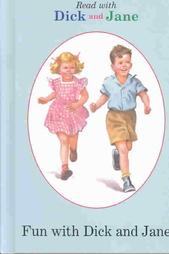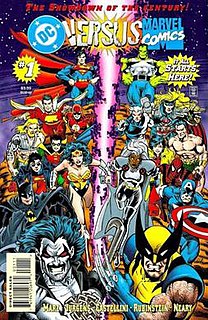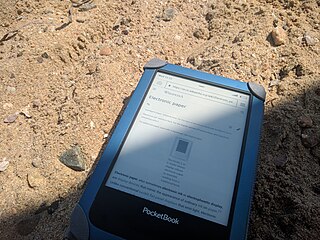A reading book or basal reader is a book used to teach children.
Reading book may also refer to:
Webcomics are comics published on a website or mobile app. While many are published exclusively on the web, others are also published in magazines, newspapers, or comic books.
Relative may refer to:
Mind reading may refer to:

Dick and Jane are the two main characters created by Zerna Sharp for a series of basal readers written by William S. Gray to teach children to read. The characters first appeared in the Elson-Gray Readers in 1930 and continued in a subsequent series of books through the final version in 1965. These readers were used in classrooms in the United States and in other English-speaking countries for nearly four decades, reaching the height of their popularity in the 1950s, when 80 percent of first-grade students in the United States used them. Although the Dick and Jane series of primers continued to be sold until 1973 and remained in use in some classrooms throughout the 1970s, they were replaced with other reading texts by the 1980s and gradually disappeared from school curricula. The Dick and Jane series were known for their simple narrative text and watercolor illustrations. Despite the criticisms of the stereotypical content that depicted white, middle-class Americans and the whole-word (look-say) method of teaching reading on which these readers are based, the characters of "Dick", "Jane", and their younger sister, "Sally", became household words. The Dick and Jane primers have also become icons of mid-century American culture and collectors' items.
Letter, letters, or literature may refer to:

Tyrone Templeton is a Canadian comic book artist and writer who has drawn a number of mainstream titles, TV-associated titles, and his own series.

DC versus Marvel Comics was a comic book miniseries crossover published by DC Comics and Marvel Comics from April to May 1996. The series was written by Ron Marz and Peter David, with art by Dan Jurgens and Claudio Castellini.
The Grand Comics Database (GCD) is an Internet-based project to build a database of comic book information through user contributions. The GCD project is cataloging information on creator credits, story details, reprints, and other information useful to the comic book reader, comic collector, fan, and scholar. The GCD is a 501(c)(3) nonprofit organization incorporated in Arkansas.
Bibliotherapy is a creative arts therapies modality that involves storytelling or the reading of specific texts with the purpose of healing. It uses an individual's relationship to the content of books and poetry and other written words as therapy. Bibliotherapy is often combined with writing therapy. It has been shown to be effective in the treatment of depression. A 3 year follow up study has suggested that the results are long-lasting.

You Can with Beakman and Jax, also known in its Spanish-language version as El Mundo de Beakman, is an American science and education syndicated comic strip by Jok Church, which ran from July 14, 1991 to July 17, 2016. The educational comic strip, and planned television series, were originally intended to be a part of the Star Wars franchise, with real world facts about science, and languages.
A reader is a person who reads. It may also refer to:
Goodreads is an American social cataloging website that allows individuals to search its database of books, annotations, quotes, and reviews. Users can sign up and register books to generate library catalogs and reading lists. They can also create their own groups of book suggestions, surveys, polls, blogs, and discussions. The website's offices are located in San Francisco. Since 2013 company is owned by the online retailer Amazon.
A comic book letter column is a section of an American comic book where readers' letters to the publisher appear. Comic book letter columns are also commonly referred to as letter columns, letter pages, letters of comment (LOCs), or simply letters to the editor. Letter columns appeared early on in the history of comic books themselves, and their growing prevalence — particularly beginning in the 1960s — helped create and legitimatize comics fandom. As the forum developed, the volume and tenor of letters became a reliable gauge of overall reader response to developments in the comics themselves. Letter columns remained a regular feature of most comic books until the early years of the 21st century, when they began being phased out in favor of the growing prevalence of email and Internet forums. Despite this, the 2010s saw a renaissance of comic book letter columns, and many comics titles still print them.

An ebook, also known as an e-book or eBook, is a book publication made available in digital form, consisting of text, images, or both, readable on the flat-panel display of computers or other electronic devices. Although sometimes defined as "an electronic version of a printed book", some e-books exist without a printed equivalent. E-books can be read on dedicated e-reader devices, but also on any computer device that features a controllable viewing screen, including desktop computers, laptops, tablets and smartphones.

G.I. Joe: A Real American Hero is a comic book that was published by Marvel Comics from 1982 to 1994. Based on Hasbro, Inc.'s G.I. Joe: A Real American Hero line of military-themed toys, the series has been credited for making G.I. Joe into a pop-culture phenomenon. G.I. Joe was also the first comic book to be advertised on television, in what has been called a "historically crucial moment in media convergence".

Iconology Inc., d/b/a ComiXology, is a cloud-based digital distribution platform for comics, with over 200 million comic downloads as of September 2013. It offers a selection of more than 100,000 comic books, graphic novels, and manga across Android, iOS, Kindle Fire, Windows 10, and the Internet. In April 2014, ComiXology became a subsidiary of Amazon.com.
Comics has developed specialized terminology. Some several attempts have been made to formalize and define the terminology of comics by authors such as Will Eisner, Scott McCloud, R. C. Harvey and Dylan Horrocks. Much of the terminology in English is under dispute, so this page will list and describe the most common terms used in comics.
Comic or Comics may refer to:
Google Play Books, formerly Google eBooks, is an ebook digital distribution service operated by Google, part of its Google Play product line. Users can purchase and download ebooks and audiobooks from Google Play, which offers over five million titles, with Google claiming it to be the "largest ebooks collection in the world". Books can be read on a dedicated Books section on the Google Play website, through the use of a mobile app available for Android and iOS, through the use of select e-readers that offer support for Adobe Digital Editions, through a web browser and reading via Google Home. Users may also upload up to 2,000 ebooks in the PDF or EPUB file formats. Google Play Books is available in 75 countries.
Lector is a free e-book reading application for desktop Linux systems that also has basic collection management features.